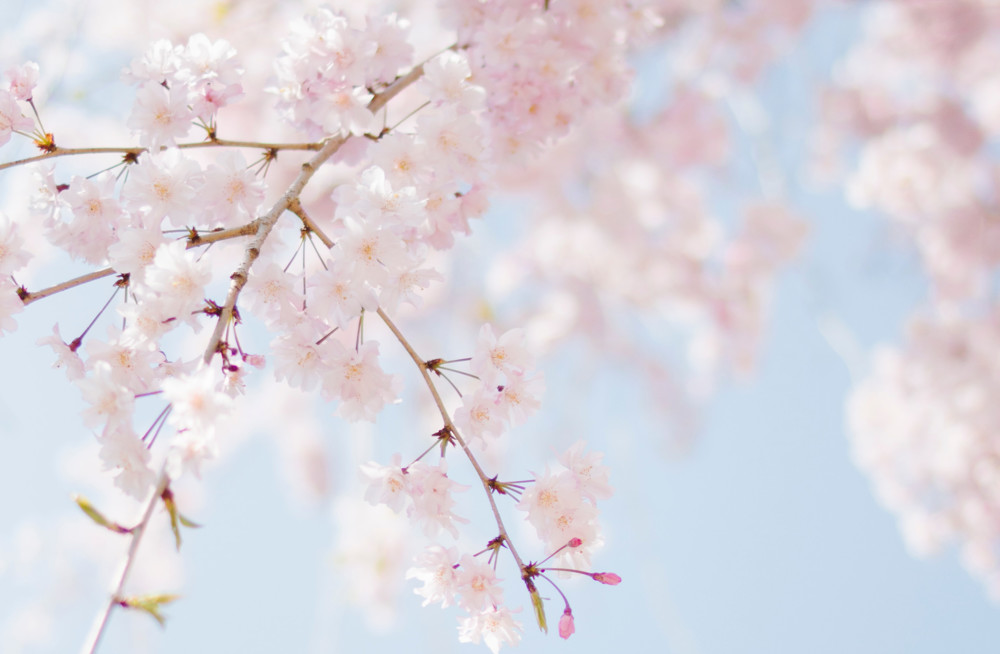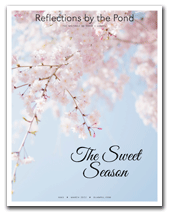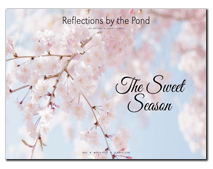We are pleased to offer two new ways to enjoy Reflections by the Pond. From the list below you may choose to either Read or Listen to individual articles from this issue.
Scroll down to read the complete, text-only version of this issue.
“When I get out, I’ll be thirty.
Corporal Walter “Radar” O’Reilly
That’s almost dead! ”
Spring is the sweet season, the season of the year in which the fresh air is fragrant with the presence of new grass, budding fruit trees, peonies, tulips, lilies of the valley, and lilacs. It is the time of revitalizing rains, cool days bathed in intense sunshine, and the sharp aroma of fresh-cut grass.
After the long and often drab months of winter, spring is the time of newness, and explosive growth, when living things change from one day to the next as quickly as a young child changes in the eyes of a doting auntie. Last year’s acorns littering the land sprout and take root, on their way to some day becoming mature trees. Even the weather itself is young in the spring, moving quickly from sunshine to thunderstorm, then back again. If autumn is the time of old men and checkers, spring is the time of youth and baseball.
Those of us bearing the load of multiple decades, especially of half-century or more, admire the elasticity of youth. We admire, even envy, their ability to stretch and run and jump without incurring irreparable damage to the body’s infrastructure. Those of us who, on the morning after, suffer the stiffness and aches of the previous day’s labors, wax nostalgic over youth’s ability to spring from their morning bed with a sprightly lightness of being.
If youth is a red Ferrari, then we of more advanced years have become a lumbering dump truck.
Youth, in its red-corpuscled exuberance, thinks that life as a whole should be as eternal spring. Since innocent youth does not acknowledge the expiration of vitality, it believes that once the sweetness of life has faded into the dusty musk of age—if, perchance, such an alien ill befall them—then what is the point? Life is probably no longer worth the bother.
A Fresh Vitality
Day by day continuing with one mind in the temple, and breaking bread from house to house, they were taking their meals together with gladness and sincerity of heart, praising God and having favor with all the people. And the Lord was adding to their number day by day those who were being saved.
Acts 2:46-47
There is a feeling of fresh vitality to a new faith. It is the sweet season in a walk with Christ. Prayers are glowingly honest and unscripted: The new Christian has not yet learned the mind-numbing vernacular of the church; he still speaks from the guileless heart, rather than the well-tempered brain. His relationship with God and God’s word is erratic but eager; every page turn brings new and stunning revelation. For him Jesus Christ is a brand new friend, and time spent with Him is a sweet and pleasurable exchange. For the new Christian Christ is electrically real.
When I was a child, I used to speak like a child, think like a child, reason like a child; when I became a man, I did away with childish things.
1 Corinthians 13:11
A new faith, however, is also a time of impetuous youth, of unformed thoughts and uninformed beliefs. It is a time of innocence and eagerness, but also of inaccurate perception.
Because the things of God are so deep, and so wide, it takes time—even persistence—to take in all the truth. On a practical level, the new Christian simply hasn’t had the time to ingest everything God wants him to know and experience. Beyond that, the new believer can make the mistake common to all youth: a feeling of invincibility. He may be of the opinion that what he knows now, at this early stage, is sufficient—that this is as good as it gets and this is all he need know. In the euphoria of fresh faith, he may purposely or inadvertently reject the unknown depths of God as he clings desperately to that which he already knows—which is very little.
The Balance of Autumn
The blooms of lilacs and the budding fruit trees smell invitingly sweet, but they fade quickly and are soon gone, withered brown in the heat of approaching summer. The succulent blooms of spring are, as well, the most inviting to those who would consume them: a weathered old oak holds little fascination for a hungry deer, but a young sapling in bud is a tasty morsel indeed.
The sweet flowers of spring wither quickly, but the mature plant that gave them birth remains, bearing up under the storms and withering heat, the bone-dry autumn, and the freezing chill of winter. Just so, the church is freshened and revived by the exuberance of new believers, but it is sustained by those old, weathered venerables whose roots have grown long and deep in the Lord.
On the surface, the older men and women of the church may be less exciting than fiery youth, but they supply the solid base to the body of Christ that youth cannot supply on its own. They have weathered the storms, the brutal heat of the harder months. They have already traveled the roads youth has not yet found.
The pillars of the church are the ones holding it up. Having been beaten up by life, they have emerged stronger, more experienced and, usually, more wise. The Spirit has been at work in them for a long time—molding, shaping, testing by fire—and by their scars they have proven themselves worthy of trust and respect.
And He gave some as apostles, and some as prophets, and some as evangelists, and some as pastors and teachers, for the equipping of the saints for the work of service, to the building up of the body of Christ; until we all attain to the unity of the faith, and of the knowledge of the Son of God, to a mature man, to the measure of the stature which belongs to the fullness of Christ. As a result, we are no longer to be children, tossed here and there by waves and carried about by every wind of doctrine, by the trickery of men, by craftiness in deceitful scheming; but speaking the truth in love, we are to grow up in all aspects into Him who is the head, even Christ, from whom the whole body, being fitted and held together by what every joint supplies, according to the proper working of each individual part, causes the growth of the body for the building up of itself in love.
Ephesians 4:11-16
Spring needs the balance of autumn, and the sweet season of a youthful faith needs the balance of a less energetic but more substantial season of age.
It is the spiritually mature that carry us from one season into the next, and though it may not be as obviously sweet, it is their season of wisdom that is the one to be desired.
It is almost impossible not to write about spring when it occurs.
Stepping out into the clean, fresh brilliance of an April morning green with exploding growth, the heart is filled with an emotion not unlike praise. The glory of a winter-dead world reawakened for spring begs to be shared, to be explained, to be expounded at length but, like the exhilaration of praise, it is difficult to describe.
Changing Clothes
Spring is a dynamic time of year—a time when the world and its people change clothes quickly. Later in the year the transition from summer to winter will be considerably slower, as the abundant life of the warmer months gradually ages and diminishes through the lingering autumn to the cold, death-like stillness of winter. But in the spring clothes are changed quickly. One day may find us wrapped in winter woolens, plowing six inches of snow off the drive, and the next day find us in shirt sleeves raking leaves. Seemingly in an instant parkas are exchanged for sweatshirts, heavy insulated boots for lighter-weight mudders, insulated gloves for leather work gloves, snow shovels for spades, and storm windows for screens.
The natural world, as well, changes clothes quickly in the spring. Almost overnight the trees sprout new growth on their naked limbs, and bare soil is populated with wide green blades hearkening the soon arrival of tulip, crocus, daffodil and iris. The brown lawn is suddenly green, and ugly thatches of dry sticks magically transform into luxuriant patches of yellows and greens.
For we also once were foolish ourselves, disobedient, deceived, enslaved to various lusts and pleasures, spending our life in malice and envy, hateful, hating one another. But when the kindness of God our Savior and His love for mankind appeared, He saved us, not on the basis of deeds which we have done in righteousness, but according to His mercy, by the washing of regeneration and renewing by the Holy Spirit, whom He poured out upon us richly through Jesus Christ our Savior, so that being justified by His grace we would be made heirs according to the hope of eternal life.
Titus 3:3-7
The exhilaration of spring in the mortal breast—human and beast alike—is very much like that indescribable exhilaration of praise. Like the joyous, early morning anthems of the winged host, it fills us to overflowing with the need to sing out in appreciation to our Maker. The season of spring itself, however, and, more to the point, its physical manifestation in the natural world, is very much like grace.
New Clothes
By His grace, God does not require us to put on clean new clothes to come to Him. Our old, filthy and smelly rags do just fine. We may come to him attired in nothing more than our dry winter nakedness, barren of anything bespeaking life and joy. We need not prove ourselves to Him. We need not improve ourselves for Him. We need not purchase new finery with which to clothe our barren ugliness. We come to God as we are.
Once we have come to Him, however, and accept who He is, He begins fitting us for new clothes—sometimes immediately, sometimes gradually over time, but always as surely as spring follows the winter.
Sometimes we are reluctant to discard permanently our old dirty clothes. We think that surely they will still be good for something on the morrow. After all, once the climate has warmed, we may need to go out and thrash through some of that hard, physical labor we once performed. Some things never change, right?
But once we put them back on, our old rags soon become as cumbersome and claustrophobic as insulated boots in June; our old habits and ways become as useless as snow fences in July. And even if the fit is still nostalgically comfortable, we realize that there is something not quite right about our old clothes. They are from a different time.
No, the old clothes have become for us like the discarded snake skin left behind in the sandy barrenness of the desert: a withered dry husk, fading quickly from memory. Our new clothes—gift from an attentive, loving Father—are what now fit us perfectly, comfortably.
New Life
Perhaps this is the visceral connection between the fresh beauty of spring and the exhilaration of praise. Springtime is the natural world throwing off its old, faded covering: that is last year; it is dried and torn; it bears if not the fact, at least the appearance of lifelessness. In the spring the natural world puts on its bright new clothes. They are fresh. They smell good. They are new and clean.
Praise is the innate response to grace. God, in His grace, gives us a new life. Then, over time, he outfits us with a brand new wardrobe. It fits perfectly. Its colors are bright and fresh. It makes us feel good—about ourselves, about others, about God. And every time we are reminded that our new life is from Him, our heart must burst forth in loud and joy-filled praise.
Over their remaining years our lives will change as surely as the seasons—but with one important exception: The dried and dead winter will never return.
Issue #863 / March 2022 / “The Sweet Season”
Reflections by the Pond is published monthly at dlampel.com and is copyright 2022 David S. Lampel. Unless otherwise indicated, all Scripture is from the New American Standard Bible (Updated Edition). This and all our resources are offered free-of-charge to the glory and praise of Christ our Lord.





